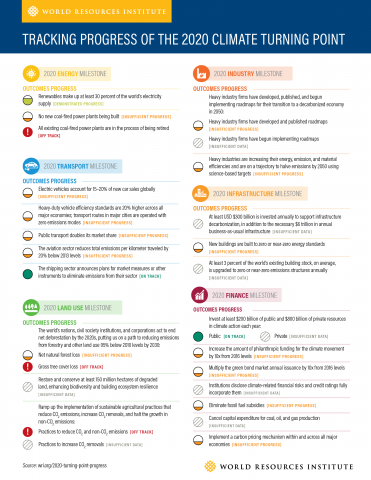In 2017 several leading climate analysis organizations came together as part of the Mission 2020 campaign to define six milestones—in energy, transport, land use, industry, infrastructure, and finance—that would need to be met by 2020 to bend the curve in global greenhouse gas emissions and put the world on a pathway consistent with the Paris Agreement. To achieve each milestone, the organizations identified two or more outcomes, and this working paper takes stock of progress made toward those outcomes.

This paper reaches the following conclusions:
- Progress is uneven across the six milestones: For some underlying outcomes in several milestones, action has been progressing and accelerating. However, in most cases action is insufficient or progress is off track (see Figure ES-1).
- Tremendous opportunities to scale up and accelerate action remain untapped across all sectors. For almost all milestones and outcomes, the opportunities must be harnessed quickly if these goals are to stay within reach. Countries also have the opportunity to enhance their commitments, or nationally determined contributions (NDCs), by 2020, under the Paris Agreement, which can catalyze action in the short term to avoid lock-in of an emissions intensive pathway in the longer term. These updated NDCs will in turn need to translate into changes in policy, actions, and investments. Related opportunities are highlighted throughout this report.
- More transparent tracking of progress is needed across many areas. Greater transparency and monitoring systems will allow us to more accurately track progress across all of the sector milestones. Our ability to track progress toward these milestones is limited by data availability. In some cases, there are data lags that may not accurately capture the action on the ground today, and it can take time for recent commitments to take effect. Generally, the completeness and lag in available data may distort the current evaluation of progress. In other cases, insufficient data impede any endeavor to assess progress toward reaching some milestones. Efforts are needed to increase transparency and generate necessary data to hold countries, companies, and regions accountable to achieving any individual commitments they have made that contribute to the milestones. Establishment of tracking systems can bring significant benefits and help identify opportunities, adjust existing plans, and guide the adoption of new actions.
Read more
